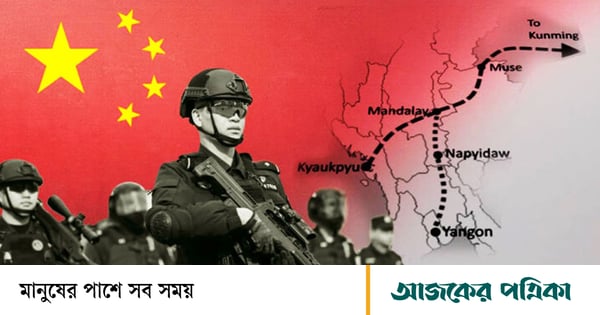China has assessed Myanmar's security and political situation over the past few years. The country has concluded that Myanmar's junta's State Administration Council (SAC) and China's Belt and Road Initiative (BRI) projects are not capable of protecting them. According to multiple sources in Beijing familiar with the matter, the SAC is considered very weak and unstable in Beijing.
According to the report of Myanmar media Irrawaddy, China has proposed the formation of a joint security company (JVSC) to the Myanmar junta forces. This sparked widespread discussion in the Myanmar media and unease among the junta's top military leaders.
Lashio, the capital of northern Shan State, fell to the rebels last August. In addition, armed conflict has increased from northern Shan to central Myanmar and Rakhine. In this context, the Chinese-owned oil and gas pipelines and the proposed BRI rail line—which would connect Kunming to the Bay of Bengal coast in Rakhine—would pass through these states or regions, and Beijing was forced to offer the protection of its projects after the bombing of the Chinese consulate in Mandalay. But it remains to be seen how ethnic armed groups and their allies will react.
Since the junta seized power following a military coup in 2021, conflict has spread throughout Myanmar. China's BRI projects in Myanmar have stalled and faced security risks since a nationwide armed uprising against the junta. Since the launch of the BRI in 2013, Chinese private paramilitary companies around the world have been active in protecting China's mega projects from violence and crime. These private security companies (PSCs) are also conducting activities such as local intelligence gathering, personnel removal, besides protecting Chinese ports and important maritime communications.
Although these institutions are private, they are all controlled by the Chinese government. These companies are mainly made up of former members of the People's Liberation Army (PLA) and the police and conduct intelligence gathering and communications operations using modern weapons and advanced technology. In short, the PSC acts as a small-scale clandestine Chinese army in places where the Chinese army cannot be deployed.
Some Chinese experts have hinted that China's show of force on the Myanmar border has had little effect. After the fall of Lashio and Chinese Foreign Minister Wang Yi's visit to Nay Pyi Taw in late August, Beijing held a military exercise near the Myanmar border. This is seen as a warning signal to the warring groups to ensure stability and security in the border areas.
China's People's Liberation Army (PLA) wants to project its influence and power around the world. However, this role is not being implemented in Myanmar's volatile border. Because, despite the exercise, attacks by resistance groups have increased across the country, including Mandalay, the second largest city in Myanmar, and they are constantly occupying large areas. An observer of China-Myanmar relations in Beijing reported this information.
Since the Myanmar conflict began in 2015, China has conducted several military exercises along the border, but the situation has worsened. Clashes escalated, the military junta lost more and more cities, and bombs and bullets dropped by junta airstrikes near the border were falling into Chinese territory.
In July, armed resistance groups seized two Chinese-invested projects in Myanmar's Mandalay region—a cement factory and a nickel mine in Sagaing region. The city of Lashio also fell in August. When the situation reached its peak, China decided, 'Enough is enough.'
Since conducting live exercises along the border in late August, Beijing's top officials have been wondering what new role the PLA could play in protecting Chinese interests in the Myanmar conflict. That is why they proposed to form a joint security company to ensure the security of Chinese projects in Myanmar. Beijing is pressuring the junta to accept this proposal.
Earlier Chinese projects in Rakhine's Kayakpayu region had their own security guards, but no modern weapons. However, the guards of the proposed joint security company will use modern weapons and advanced intelligence and communication technology. It is not yet clear what Beijing and Nay Pyi Taw's joint security plan will look like in Myanmar's disputed economic corridor. But it would be too early to make predictions about this.

